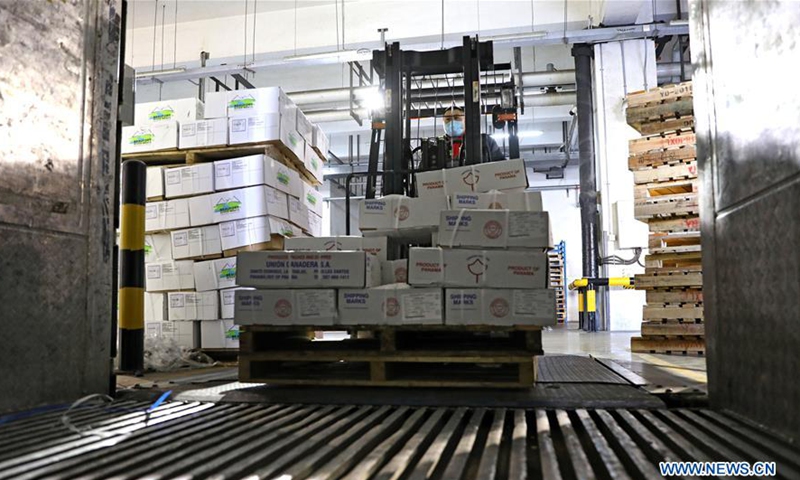More regions report cold-chain virus contamination as Customs tightens screening
By Fan Anqi Source: Global Times Published: 2020/11/15 18:32:28

A worker unloads boxes of imported frozen meat at a cold storage at Dalian port in Dalian, northeast China's Liaoning Province, April 8, 2020. Since it resumed operation, the port has streamlined its cold chain operation attempting to achieve greater efficiency. (Xinhua/Yao Jianfeng)
China reported two more cases of coronavirus-contaminated imported frozen products on Sunday, one in Sishui, East China's Shandong Province, and the other in Xi'an, Northwest China's Shaanxi Province, pushing the number of cold-chain virus contaminations to at least 10 provincial regions in the country since June.
Observers explained that the recent flare-ups could be attributed to the latest wave of COVID-19 cases overseas, while suggesting a complete screening of all imported products as winter brings lower temperatures that could turn goods into virus carriers.
Sishui and Xi'an each reported one coronavirus-contaminated imported frozen product on Sunday, thepaper.cn reported.
The 109 products linked with infected pork imported from Argentina in Xi'an have been sealed off before entering the market, with 18 close contacts traced and put under medical observation, all of whom have received negative nucleic acid test results.
Shanghai on Sunday required nucleic acid tests and disinfection of outer packages for all high-risk imported frozen food starting Monday.
Zhengzhou, Central China's Henan Province, reported a batch of Argentina-originated frozen pork products whose outer packages have been found to be carrying coronavirus, local disease control and prevention authorities said on Friday, China News reported.
Five out of 15 samples from the outer packaging tested positive, and all personnel involved have received nucleic acid tests with negative results. The batch was immediately sealed off before entering the market.
Since June, more than 10 provinces and cities including Beijing, Liaoning, Anhui, Fujian and Jiangxi have discovered coronavirus-positive samples taken from imported frozen food or food packaging.
Wu Zunyou, chief epidemiologist of the Chinese Center for Disease Control and Prevention, explained that the recent flare-ups could be attributed to the mounting numbers of COVID-19 cases across the globe, which brought bigger chances of contaminating local products which are later transported to China, CCTV News reported.
The upcoming winter season in the northern hemisphere could be another reason, as coronavirus lives longer in lower temperatures, Wu said, adding that strengthened measures in cold-chain monitoring have allowed contaminated goods to be spotted in time.
However, frozen food imports cannot be banned entirely, as China needs large amount of imports to fill the gaps in domestic supply, said Qin Yuming, an official at the China Federation of Logistics and Purchasing.
"Strict management, testing, and disinfection work for imported products have been applied throughout the dealing process, and the goods in question only make up a small portion of the total," Qin noted.
In a bid to minimize the potential contamination risks, Chinese Customs held talks with all 109 countries that export frozen food to China, and announced it would suspend declarations from companies that are suffering from virus infections among its staff, CCTV News reported on Saturday.
The announcement involves 99 companies from 20 countries.
The move came after the State Council's issuance of guidelines on cold-chain food disinfection on November 9, which regulate that imported frozen products must be traceable and receive closed-loop management throughout the whole process.
The duties of customs, transportation, health, and market supervision departments as well as local governments were also clarified in the statement.
As the northern hemisphere enters winter, goods transportation from overseas shares similar risks as cold-chain food transportation, as they may also become carriers of the coronavirus, Wu Zunyou told the Global Times on Sunday.
Apart from cold-chain tracing, all batches of goods from overseas must be tested upon arrival, Wu stressed.
"Samples from the surrounding environments, the outer packaging, and the imported goods themselves must be taken for testing in winter, as well as the carriers conveying them," Wu said.
Staff involved in these processes should take nucleic acid tests on a regular basis to screen out sporadic infections as early as possible. Training for industry supervision and disease prevention is also needed, Wu noted.
Posted in: SOCIETY